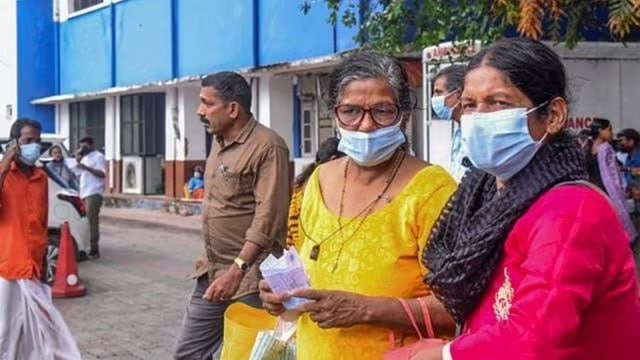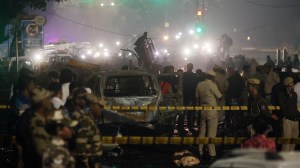Slight spike in Covid-19 cases in Maharashtra linked to new JN.1 variant vigilance
State has advised citizens to wear masks and follow Covid-appropriate behaviour
 India's first patient with the new Omicron subtype—JN.1 has been identified in Kerala. (PTI Photo)
India's first patient with the new Omicron subtype—JN.1 has been identified in Kerala. (PTI Photo)Amid ongoing speculation about a potential surge in Covid-19 cases, after the identification of India’s first patient with the new Omicron subtype—JN.1 in Kerala, there has been a slight uptick in active cases in Maharashtra. The state, which had 19 active cases on December 9, recorded an increase to 35 cases over the next ten days.
Authorities attribute this rise to intensified testing, aligning with the directive from the Centre to enhance vigilance.
The data analysed by The Indian Express reveal that from November 30 to December 9, the state consistently reported an average of 1 to 3 new Covid-19 cases daily. However, the scenario shifted as of December 18, with 13 new cases recorded, followed by 11 cases on December 19. By Tuesday, active cases had risen to 35 in Maharashtra, indicating a gradual increase in infections during the recent period.
“In the last one week, we have increased the testing (which is still below 600 per day). Also, we are mostly now testing symptomatic patients with cough, cold and fever so, it is reflecting in the figure,” said a senior health officer.
As a precautionary measure, following Karnataka’s mandate on wearing masks outdoors, Maharashtra has subsequently advised its citizens to wear masks as needed and follow Covid-appropriate behaviour. The state health department confirmed on Tuesday that, at present, no cases of the JN.1 variant have been detected in Maharashtra.
The sub-variant JN.1 is a progeny of the BA.2.86 variant, also known as Pirola, and is not entirely novel. Cases of this variant were first identified in the United States in September, with the initial global case reported as early as January of this year.
Nevertheless, the state health department has reassured the public not to be alarmed. A senior health officer from the Directorate of Health Service (DHS) stated, “We have consistently conducted whole genome sequencing. As of now, there has been no detection of the JN.1 variant in the state.” Emphasising caution, the officer added, “However, it remains crucial to take preventive measures such as wearing masks when necessary, practicing frequent handwashing, and adhering to other recommended Covid behaviours.”
As a precautionary measure, all districts have been directed to enhance vigilance, implementing measures to bolster the surveillance of patients with Influenza-like illness (ILI) and Severe Adverse Respiratory Infection (SARI).
“Mandatory testing for individuals identified with ILI and SARI symptoms during these surveys has been enforced, with districts strongly encouraged to intensify Covid testing efforts,” reads a statement issued by the state health department.
In accordance with the directives of the Government of India, comprehensive mock drills were conducted from December 15 to 17 in secondary and tertiary health institutions across the state. A total of 1,264 institutions participated, including 655 government hospitals, 575 private hospitals, 14 government medical colleges, and 14 private medical colleges. These drills involved evaluating hospital resources and submitting comprehensive information. Remarkably, the state now has double the oxygen capacity compared to the peak of Covid cases.
The state-wide mock drill provided valuable insights into the state’s hospital facilities, including 63,675 isolation beds, 33,404 oxygen beds, 9,521 ICU beds, and 6,003 ventilator beds across 1,264 hospitals. The healthcare workforce comprises 23,701 doctors, with 22,330 specifically trained for Covid.
Dr Avinash Bhondwe, former president of IMA said, “In managing the JN.1 variant, imperative precautions are necessary. The judicious use of masks in densely populated indoor environments is advisable amid the surge. Comprehensive research is indispensable for elucidating transmissibility, immune evasion, and severity, necessitating meticulous surveillance and adaptable responses.”







